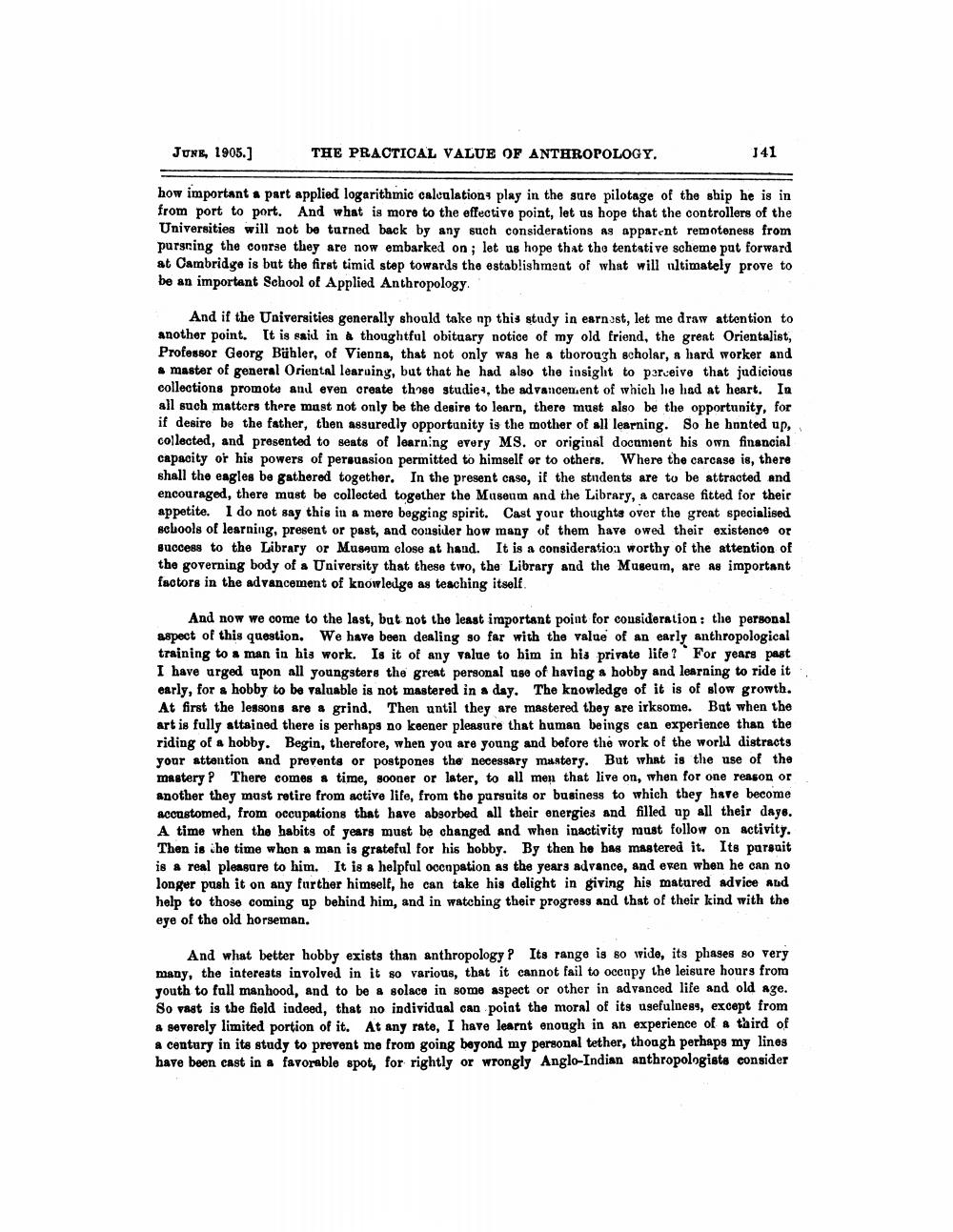________________
JUNE, 1905.]
THE PRACTICAL VALUE OF ANTHROPOLOGY.
141
how important part applied logarithmic calculation play in the gare pilotage of the ship he is in from port to port. And what is more to the effective point, let us hope that the controllers of the Universities will not be turned back by any such considerations as apparent remoteness from pursning the conrse they are now embarked on; let us hope that the tentative scheme put forward at Cambridge is but the first timid step towards the establishment of what will ultimately prove to be an important School of Applied Anthropology
And if the Universities generally should take np this study in earnust, let me draw attention to another point. It is said in a thoughtful obituary notice of my old friend, the great Orientalist, Professor Georg Bühler, of Vienna, that not only was he a thorough scholar, a hard worker and a master of general Oriental learning, but that he had also the insight to parceive that judicious collections promote and even create those studies, the advancement of which lie had at heart. In all such matters there mast not only be the desire to learn, there must also be the opportunity, for if desire be the father, then assuredly opportunity is the mother of all learning. So he hunted up, collected, and presented to seats of learning every MS. or original document his own financial capacity or his powers of persuasion permitted to himself or to others. Where the carcase is, there shall the eagles be gathered together. In the present case, if the students are to be attracted and encouraged, there must be collected together the Museum and the Library, a carcase fitted for their appetite. I do not say this in a mere begging spirit. Cast your thoughts over the great specialised schools of learning, present or past, and consider how many of them have owed their existence or success to the Library or Museum close at hand. It is a consideratioa worthy of the attention of the governing body of a University that these two, the Library and the Museum, are as important factors in the advancement of knowledge as teaching itself
And now we come to the last, but not the least important point for consideration : the personal aspect of this question. We have been dealing so far with the value of an early anthropological training to a man in his work. Is it of any value to him in his private life? For years past I have urged upon all youngsters the great personal use of having a hobby and learning to ride it, early, for a hobby to be valuable is not mastered in a day. The knowledge of it is of slow growth. At first the lessons are a grind. Then until they are mastered they are irksome. Bat when the art is fully attained there is perhaps no keener pleasure that human beings can experience than the riding of a hobby. Begin, therefore, when you are young and before the work of the worlu distracts your attention and prevents or postpones the necessary mastery. But what is the use of the mastery? There comes a time, sooner or later, to all men that live on, when for one reason or another they must retire from active life, from the pursuits or business to which they have become accustomed, from occupations that have absorbed all their energies and filled up all their daye. A time when the habits of years must be changed and when inactivity must follow on activity. Then is ihe time when a man is grateful for his hobby. By then he has mastered it. Its pursuit is a real pleasure to him. It is a helpful occupation as the years advance, and even when he can no longer push it on any further himself, he can take his delight in giving his matured advice and help to those coming up behind him, and in watching their progress and that of their kind with the eye of the old horseman.
And what better hobby exists than anthropology ? Its range is so wide, its phases so very many, the interests involved in it so various, that it cannot fail to occupy the leisure hours from youth to full manhood, and to be a solace in some aspect or other in advanced life and old age. So vast is the field indeed, that no individual can point the moral of its usefulness, except from a severely limited portion of it. At any rate, I have learnt enough in an experience of a third of a century in its study to prevent me from going beyond my personal tether, though perhaps my lines have been cast in a favorable spot, for rightly or wrongly Anglo-Indian anthropologists consider




